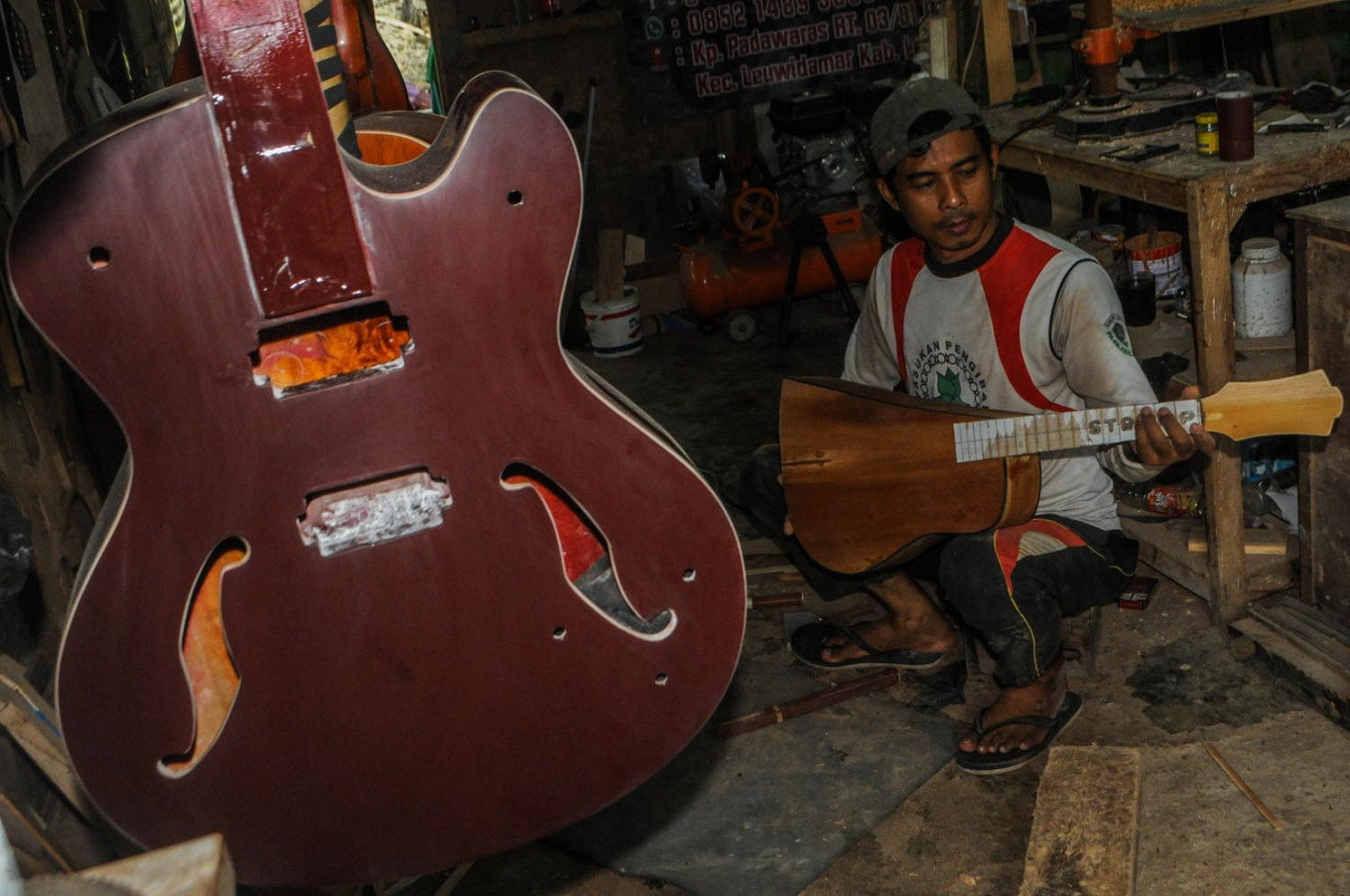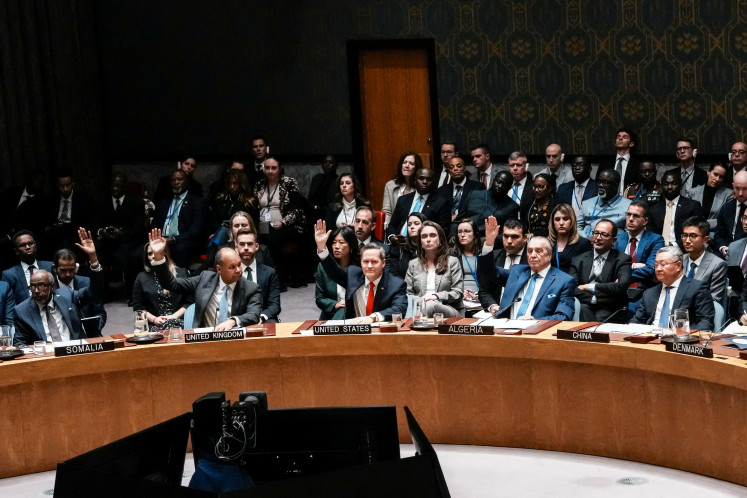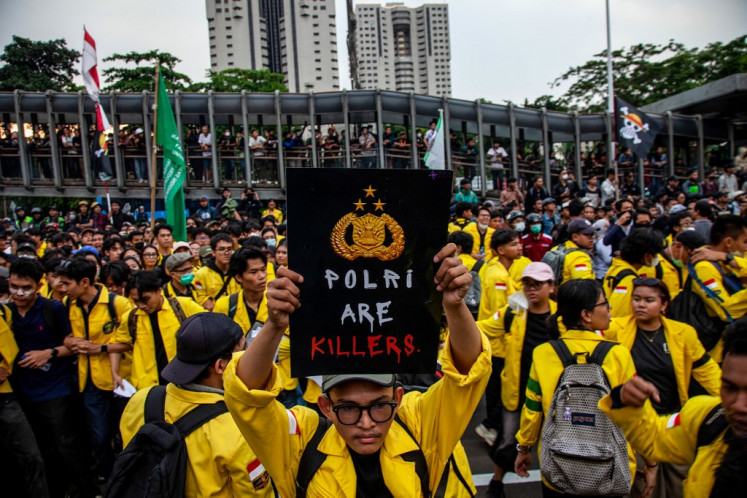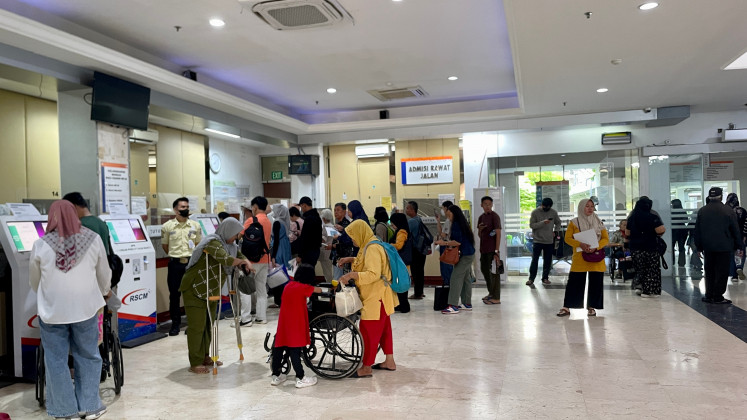Popular Reads
Top Results
Can't find what you're looking for?
View all search resultsPopular Reads
Top Results
Can't find what you're looking for?
View all search results$1.49b earmarked for unbanked businesses
MSMEs, which account for around 60 percent of Indonesia’s gross domestic product (GDP), are among the hardest-hit businesses during the coronavirus outbreak as demand weakens and bank loans become harder to access.
Change text size
Gift Premium Articles
to Anyone
T
he government is set to disburse on Monday Rp 22 trillion (US$1.49 billion) in cash transfers for millions of unbankable micro, small and medium enterprises (MSME) to help them start over during the slowing, pandemic-hit economy.
According to Cooperatives and Small and Medium Enterprises Minister Teten Masduki, funds had been allocated for the first phase of the program, which will see 9.1 million MSMEs receive Rp 2.4 million each. It eventually aims to provide cash transfers for 12 million MSMEs.
He said the government had compiled data on around 17 million MSMEs, including from cooperatives, regional administrations and the Financial Services Authority (OJK), adding that the government would “verify and validate” the data so that the stimuli could be “well-targeted”.
“The President has agreed to provide productive aid for MSMEs in a bid to address their financing problems,” Teten told reporters in a virtual press briefing. “The COVID-19 pandemic has hit MSMEs hard as it has disrupted their supply, distribution and demand.”
MSMEs, which account for around 60 percent of Indonesia’s gross domestic product (GDP), are among the hardest-hit businesses during the coronavirus outbreak as demand weakens and bank loans become harder to access.
With sudden closures and falling demand, around half of small businesses are running out of cash or savings, according to a survey of 1,165 businesses conducted between April and May by the Asian Development Bank (ADB).
President Joko “Jokowi” Widodo has ordered the allocation of Rp 123.47 trillion in stimuli for MSMEs, including fund placement in banks to boost working capital loan disbursements and loan interest subsidies, in addition to the latest cash transfers.
Finance Minister Sri Mulyani Indrawati said on Tuesday that the government was also mulling over a plan to provide a zero-interest-rate loan worth up to Rp 2 million each to ultra-micro enterprises.
However, only Rp 32.5 trillion or 27.1 percent from the allocated funds have been disbursed as of Aug. 6, including Rp 30 trillion in fund placements in state-owned banks.
Economic recovery task force head Budi Gunadi Sadikin conceded in the same briefing that budget absorption in several stimulus programs for MSMEs was “lower than previously expected” and stressed the government would create new programs to maximize spending.
“This productive aid for MSME can be quickly disbursed because the data is sufficiently available in the financial institutions,” he went on to say, adding that the government worked to accelerate spending to prevent a further economic contraction in the third quarter.
Indonesia’s economy shrunk 5.32 percent year-on-year (yoy) in the second quarter, the steepest decline since the first quarter of 1999, as household spending, which accounts for more than half of GDP, fell 5.51 percent yoy in the period.
Meanwhile, investment, the second-largest contributor, contracted 8.61 percent as exports and imports shrank by 11.66 percent and 16.97 percent, respectively, due to slowing global trade.
Indonesian MSME association (Akumindo) chairman Ikhsan Ingratubun that welcomed the Rp 2.4 million aid as it would be the first of its kind. Previously, the government’s assistance mostly came in the form of loans.
A member of the association in South Sumatra, among other members, has received information on the mechanism to obtain the assistance, according to Ikhsan.
“We welcome it because the purpose is to spur small businesses’ spending as the more they spend, the more [producers of] products like vegetables and meat and the transportation sector will benefit from it,” Ikhsan said in a phone interview on Tuesday. “GDP will in turn pick up.”
The productive social assistance is important as small businesses need cash, especially in times of volatility, uncertainty, complexity and ambiguity like in the pandemic, said Zahir Machmud, the head of the University of Indonesia’s SMEs Center. This added to the urgency to speed up disbursement.
“I hope it can get [small businesses] going again,” said Zahir. “But there is a challenge with regard to data. Our data is still scattered, which poses a challenge to move quickly and ensure [the disbursement] is well-targeted.”
The government has made various efforts to support and strengthen small businesses in the country. Recently, Sri Mulyani called on civil servants to spend their newly disbursed bonuses to buy local products from MSMEs.
Coordinating Economic Minister Airlangga Hartarto said the government was also nudging small businesses to sell their products online to keep raising money amid large-scale social restrictions.
Between May 14 and July 31, about 1.4 million MSMEs went online. The figure accounted for 70 percent of the government’s target of encouraging 2 million small businesses to do so this year.
“We hope MSMEs can utilize this digitalization [trend] because of its extraordinary potential. The Indonesian digital market is estimated to be valued up to $125 billion by 2025,” Airlangga said.










